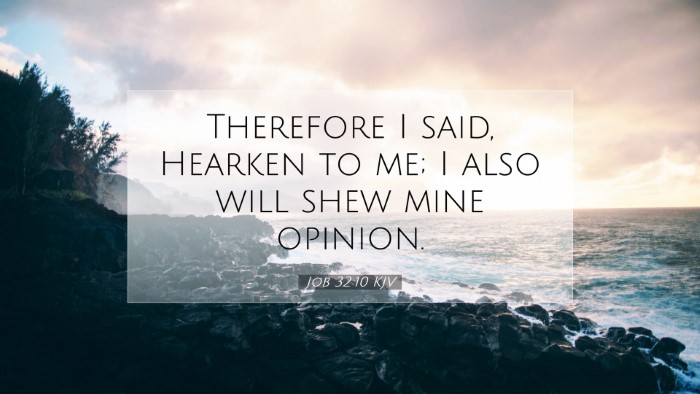Old Testament
Genesis Exodus Leviticus Numbers Deuteronomy Joshua Judges Ruth 1 Samuel 2 Samuel 1 Kings 2 Kings 1 Chronicles 2 Chronicles Ezra Nehemiah Esther Job Psalms Proverbs Ecclesiastes Song of Solomon Isaiah Jeremiah Lamentations Ezekiel Daniel Hosea Joel Amos Obadiah Jonah Micah Nahum Habakkuk Zephaniah Haggai Zechariah MalachiJob 32:10
Job 32:10 KJV
Therefore I said, Hearken to me; I also will shew mine opinion.
Job 32:10 Bible Commentary
Commentary on Job 32:10
Job 32:10 states: "Therefore I say, Hearken to me; I also will show mine opinion." This verse emerges during a pivotal moment in the Book of Job, where a young character named Elihu introduces his perspective in the discourse surrounding Job's suffering and the nature of divine justice. Below, we gather insights from several public domain commentaries, providing a rich exploration of this verse.
Contextual Overview
Before delving into the specifics of Job 32:10, it's crucial to understand the context of the verse. Elihu's speeches begin from Job 32 and continue through chapter 37. He is distinct from Job's three friends, who had failed to provide satisfactory answers to Job's plight. Elihu, a younger figure, is conscious of the need for wisdom with age, yet he feels compelled to speak.
Insights from Matthew Henry
According to Matthew Henry's Commentary, this verse highlights the tone of Elihu's assertion. He respectfully invites the frustrated Job to listen, emphasizing the importance of humility in receiving correction or counsel. Henry suggests that Elihu’s youthful energy symbolizes freshness in perspective, contrasting with the stagnation of older friends who failed in their arguments.
- Invitation to Hearken: Elihu's call to "Hearken to me" signifies a shift. It implies that genuine wisdom is not solely dependent on age but can emerge from the thoughtful contemplation of truth.
- Expression of Opinion: The phrase "I also will show mine opinion" demonstrates Elihu's intent to furnish a perspective that is free from the biases that clouded the earlier discussions. He positions himself as a mediator who seeks to clarify rather than condemn.
Insights from Albert Barnes
Albert Barnes’ Notes on the Bible provide a detailed examination of Elihu’s motivation. Barnes notes that Elihu had been silent out of respect for age and the presumed wisdom of Job's friends. However, the lack of satisfactory answers prompts him to contribute his understanding, particularly focusing on God's justice.
- Reconciliatory Role: Elihu’s statement can be interpreted as his desire to reconcile Job's afflictions with God's justice. This highlights the need for theological dialogue grounded in sincerity rather than debate.
- Character of Elihu: Barnes emphasizes that Elihu embodies the characteristics of a wise counselor, one who listens before speaking. This trait is crucial for anyone engaged in pastoral care or theological education.
Insights from Adam Clarke
In Adam Clarke's Commentary, Clarke explores the implications of Elihu’s declaration. He points to the necessity for dialogue in the quest for understanding divine will.
- The Role of Youth: Clarke observes Elihu's youth as a relevant factor, suggesting that youthful insight can often lead to revelations that older individuals might overlook due to their entrenched views.
- Expressing Opinions: The phrase "I also will show mine opinion" invites reflection on the value of sharing personal insights within the community of faith, which can foster growth and understanding amidst differing opinions.
Theological Reflections
This verse serves as an essential springboard for a multitude of theological reflections:
- The Nature of Wisdom: The idea that wisdom is not limited to age encourages new and seasoned believers alike to engage in dialogue and share insights actively. Each voice in the faith community contributes to the collective wisdom.
- Listening and Dialogue in Theology: Elihu models the importance of listening, underscoring that understanding often comes through discourse. For pastors and theologians, this calls for creating environments where open and respectful conversations can flourish.
- Human Opinion versus Divine Truth: While Elihu offers his perspective, it is a reminder that human understanding is inherently limited, and we must continually seek God’s truth through the Scriptures and prayer.
Conclusion
Job 32:10 stands out as a crucial turning point in the discourse between Job and his companions. Elihu's statement not only underscores the dynamics of wisdom and age but also invites a broader discussion on the role of dialogue in theological reflection. By synthesizing insights from Matthew Henry, Albert Barnes, and Adam Clarke, we see a multifaceted understanding of the text that serves to encourage pastors, students, theologians, and Bible scholars alike.


